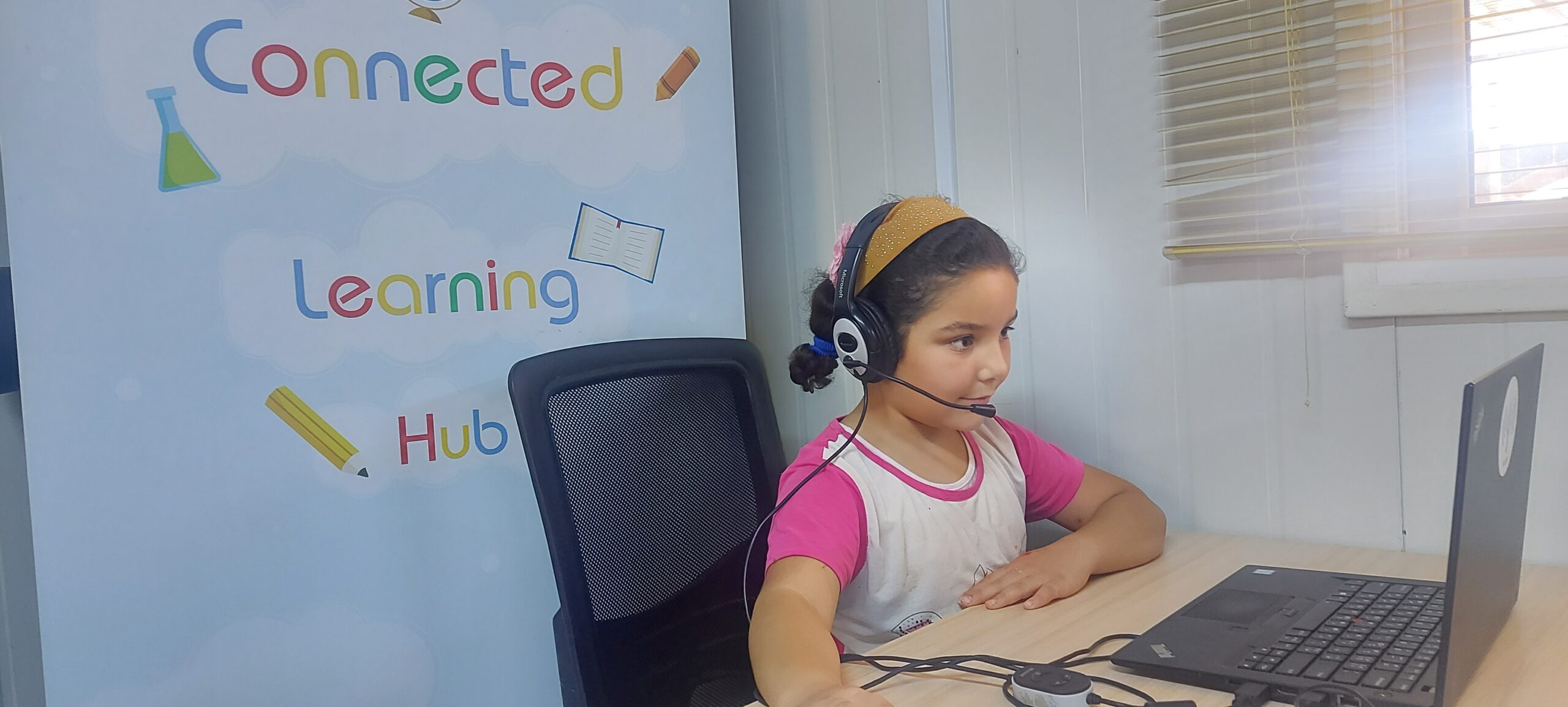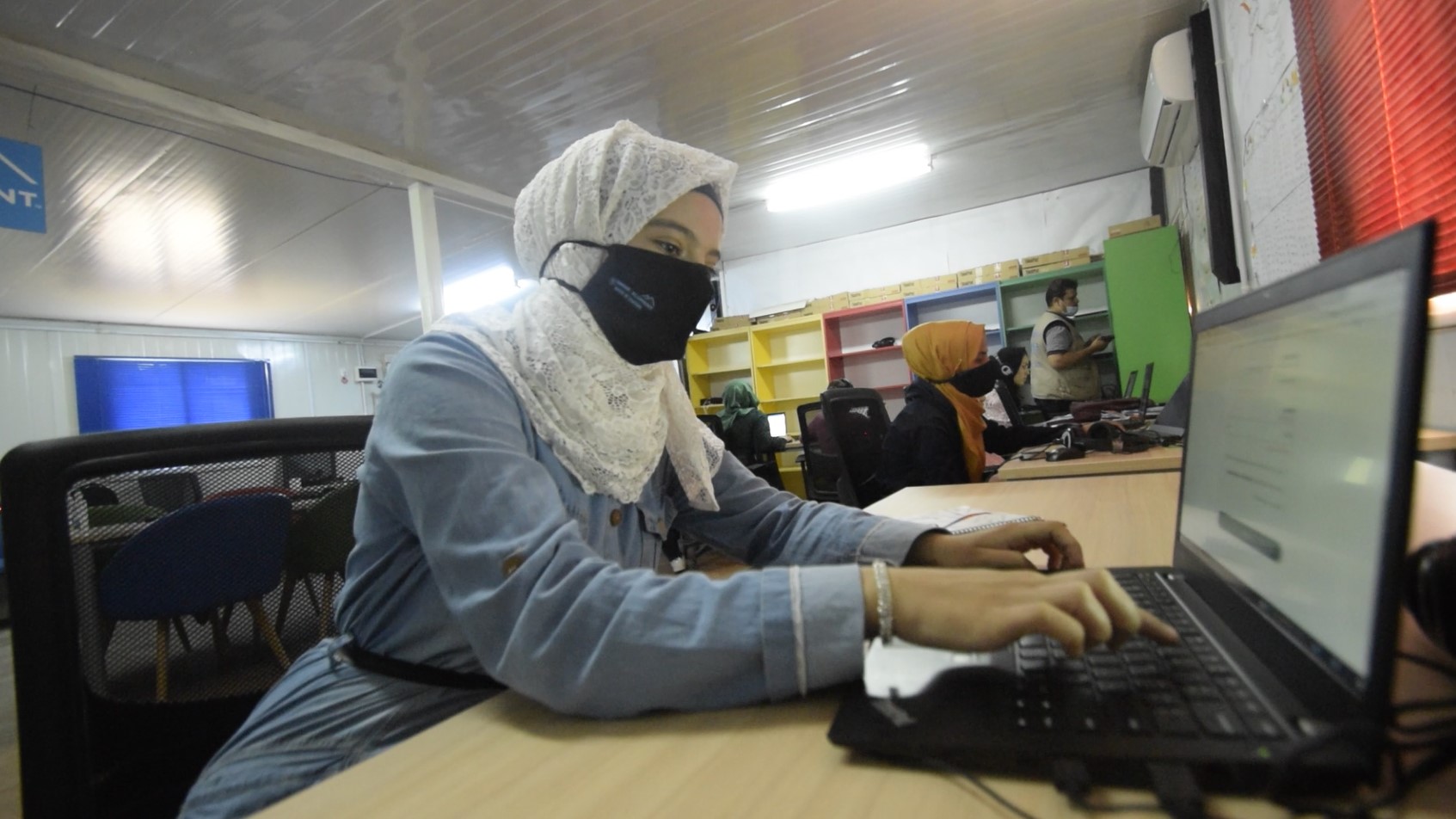This article was written by Alaa, a Syrian refugee who lives at Za’atari camp in Jordan where she also works at the Innovation Lab. Alaa is studying journalism at university. The story is available in Arabic below.
Since the outbreak of the COVID-19 pandemic and the imposition of lockdowns around the world, people are using the internet and social networking sites more than before. This has resulted in the exploitation of these digital spaces to subject women and girls to violence, especially extortion and electronic harassment. Blumont is working with women and girls in Za’atari Camp to spread awareness about online harassment.
The 16 Days of Activism Against Gender-Based Violence campaign is an annual event that runs from November 25 to December 10, and this year the campaign seeks to raise digital awareness – to prevent and combat the online harassment girls are exposed to.
In this context, Muhammad Al-Rashdan, a trainer with Blumont’s team at the Learning Center at the Za’atari refugee camp in Jordan, said: “The recent increase in victims of online harassment, especially of women and girls, prompted the Learning Center team to prepare material on safe internet browsing. We have given out materials in several sessions via Zoom that targeted all parts of the local community, including parents, youth, and children.”
Children’s safety
Young girls need to be protected online. In the training, parents learned about the importance of building trust with their children and creating their own accounts through internet applications specifically for children, such as “YouTube Kids.” Thus, parents can ensure that their children have access to age-appropriate videos while inappropriate content is prohibited.
Maryam, one of the training participants, said: “The course drew attention to the importance of building trust with my teenage daughter, so I asked her to share the content and sites that she follows with me.” Today, Maryam is spreading what she learned during the course with other mothers in the camp, like how parents’ control over the content their children watch can reduce the risks of unsafe internet use.

A child using a computer under supervision at the Learning Center.
Safeguarding women’s personal information
According to Hammam Al-Salamat, one of the trainers at the camp’s Innovation Lab, women and girls are more likely to have their personal information stolen.
The team raised awareness among women about sharing personal information and data online (including photos) and warned them about accepting unknown friendships or clicking on unfamiliar links. Practicing safe internet conduct can reduce their exposure to “online blackmail,” the risk of hacking, and theft of their personal data.
Maysa, 19, who is also a beneficiary of the course, explained: “During the course, I learned some privacy and security settings that ensure that my account will not get hacked. Girls need to know about this so we can be cautious while using digital technology.”
Al-Salamat stressed the importance of activating security measures on phones and email accounts through two-step verification. Additionally, he shared how to protect user data when browsing the Internet by choosing privacy settings that block websites’ access to users’ geographic location, camera, and personal files.

The team is raising awareness among women and girls about safely sharing personal information.
Dealing with harassment and unwanted internet conduct
Preventing any kind of harassment is at the forefront of our work. Community Protection Coordinator Mina Al-Hashimi explained that her team is “always interested in providing training material on the ‘Code of Conduct and Work’ for any volunteer or employee before he or she starts working with us or communicates with the community in the field. This ensures that no one who benefits from our programs is attacked or harassed by our humanitarian workers, and that they do not abuse their power.”
Our team makes an effort to create an environment where anyone can report an issue in a safe and confidential way. Currently, there are five reporting channels at Za’atari refugee camp for residents and employees to submit concerns, including information about harmful internet conduct.
“We always strive to develop better communication and complaints mechanisms, so we can avoid, as much as possible, issues of exploitation, harassment, and sexual assault against our community,” said Al-Hashimi.
زيادة الوعي الرقمي لمنع التحرش على الإنترنت بالنساء والفتيات
ألاء، كاتبة هذا المقال، لاجئة سورية تعيش في مخيم الزعتري للاجئين في الأردن حيث تعمل أيضًا في مختبر الابتكار. ألاء درست الصحافة والإعلام
.وهي مهتمة بتغطية قضايا اللاجئين داخل مخيم الزعتري
منذ اندلاع وباء كوفيد-١٩ وفرض عمليات الإغلاق في جميع أنحاء العالم، أصبح الناس يستخدمون الإنترنت ومواقع الشبكات الاجتماعية أكثر من ذي قبل. وقد أدى ذلك إلى استغلال هذه المساحات الرقمية لتعريض النساء والفتيات للعنف وخاصة الابتزاز والتحرش الإلكتروني. تعمل بلومونت مع
.النساء والفتيات في مخيم الزعتري لنشر الوعي حول التحرش عبر الإنترنت
حملة ١٦ يومًا من النشاط ضد العنف على أساس النوع هي حدث سنوي يمتد من ٢٥ نوفمبر إلى ١٠ ديسمبر، وتسعى الحملة هذا العام إلى زيادة الوعي
.الرقمي – لمنع ومكافحة التحرش الذي تتعرض له الفتيات عبر الإنترنت
وفي هذا السياق، قال محمد الرشدان، مدرب فريق بلومونت في مركز التعلم الإلكتروني في مخيم الزعتري للاجئين في الأردن، إن “الزيادة الأخيرة في ضحايا التحرش عبر الإنترنت، وخاصة النساء والفتيات، أدت إلى أن يقوم فريق مركز التعلم الإلكتروني بإعداد مواد خاصة بالتصفح الآمن
“.للإنترنت. لقد قدمنا مواد في عدة جلسات عبر Zoom استهدفت جميع مكونات المجتمع المحلي، بما في ذلك الآباء والشباب والأطفال
سلامة الأطفال
تحتاج الفتيات الصغيرات إلى الحماية عبر الإنترنت. أثناء التدريب، تعرف الآباء على أهمية بناء الثقة مع أطفالهم وإنشاء حساباتهم الخاصة من خلال تطبيقات الإنترنت المخصصة للأطفال، مثل “أطفال يوتيوب.” وبالتالي، يمكن للوالدين ضمان وصول أطفالهم إلى مقاطع الفيديو المناسبة لفئتهم
.العمرية بينما يُحظر المحتوى غير اللائق
مريم، إحدى المشاركات في التدريب، قالت: “لفتت الدورة الانتباه إلى أهمية بناء الثقة مع ابنتي المراهقة، لذلك طلبت منها مشاركة المحتوى والمواقع التي تتابعها معي.” واليوم، تنشر مريم ما تعلمته خلال الدورة مع أمهات أخريات في المخيم، مثل كيف يمكن لسيطرة الآباء على المحتوى الذي يشاهده
.أطفالهم أن تقلل من مخاطر الاستخدام غير الآمن للإنترنت
حماية المعلومات الشخصية للمرأة
.وفقًا لما قاله همام السلامات، أحد المدربين في معمل الابتكار في المخيم، من الأكثر ترجيحا أن تتم سرقة معلومات النساء والفتيات الشخصية
عمل الفريق على زيادة الوعي بين النساء حول مشاركة المعلومات والبيانات الشخصية عبر الإنترنت (بما في ذلك الصور) وحذرهن من قبول صداقات غير معروفة أو النقر على روابط غير مألوفة. يمكن أن تقلل ممارسة السلوك الآمن عبر الإنترنت من تعرضهم لـ “الابتزاز عبر الإنترنت”،
.وخطر القرصنة وسرقة بياناتهم الشخصية
أوضحت ميساء، ١٩ عامًا، وهي أيضًا مستفيدة من الدورة: “خلال الدورة، تعلمت بعض إعدادات الخصوصية والأمان التي تضمن عدم اختراق
“.حسابي. تحتاج الفتيات إلى معرفة ذلك حتى نتمكن من توخي الحذر أثناء استخدام التقنية الرقمية
وشدد السلامات على أهمية تفعيل الإجراءات الأمنية على الهواتف وحسابات البريد الإلكتروني من خلال التحقق من الشخص بخطوتين. بالإضافة إلى ذلك، شارك كيفية حماية بيانات المستخدم عند تصفح الإنترنت عن طريق اختيار إعدادات الخصوصية التي تمنع وصول مواقع الويب إلى الموقع
.الجغرافي للمستخدمين والكاميرا والملفات الشخصية
التعامل مع المضايقات والسلوك غير المرغوب فيه عبر الإنترنت
يتصدر عملنا منع أي نوع من التحرش. أوضحت منسقة حماية المجتمع مينا الهاشمي أن فريقها “مهتم دائمًا بتقديم مواد تدريبية حول كود السلوك والعمل لأي متطوع أو موظف قبل أن يبدأ العمل معنا أو يتواصل مع المجتمع في الميدان. وهذا يضمن عدم مهاجمة أي شخص يستفيد من برامجنا أو
“.مضايقته من قبل العاملين في المجال الإنساني لدينا، وأنهم لا يسيئون استخدام سلطتهم
يبذل فريقنا جهدًا لإنشاء بيئة يمكن لأي شخص من خلالها الإبلاغ عن مشكلة بطريقة آمنة وسرية. حاليًا، هناك خمس قنوات للإبلاغ في مخيم الزعتري
“.للاجئين للمقيمين والموظفين لتقديم مخاوفهم، بما في ذلك معلومات حول السلوك الضار على الإنترنت
وقالت الهاشمي: “نسعى دائمًا إلى تطوير آليات تواصل وشكاوى أفضل، حتى نتمكن قدر الإمكان من تجنب قضايا الاستغلال والتحرش والاعتداء
“.الجنسي ضد مجتمعنا



